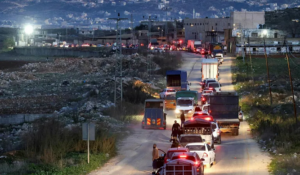Israeli government orders the blocking of dozens of West Bank roads through end of hostage deal

Palestinian vehicles queue to cross the Israeli controlled Beit Furik checkpoint in the occupied West Bank, east of Nablus, on 21 January 2025
Hagar Shezaf reports in Haaretz on 22 January 2025:
Israeli leadership ordered the army to operate dozens of checkpoints on roads leading to Palestinian cities in the West Bank and check every Palestinian vehicle passing through them.
Haaretz has learned that the order, which will be in effect throughout the cease-fire’s first stage, was issued at the cabinet’s demand. Meanwhile, there are huge traffic jams all across the West Bank, greatly affecting Palestinians’ daily routines.
A Ramallah-area resident talked to Haaretz about the impact of the checkpoints. “My husband has been stuck in a traffic jam at the checkpoint on the road back to Ramallah for three hours. My neighbor was stuck in Ramallah and couldn’t pick up her children at kindergarten,” she said. “It was never like this, even at the start of the war.”
Another resident from the area said that travel from Ramallah to his village took eight hours. “Why? We don’t know. It’s a pressure cooker, unbelievable. Going from the city to this village is like passing between countries – eight hours.”
On Monday, travelers reported delays of six hours at checkpoints on roads in the Ramallah area. Large traffic jams were also reported in the Nablus and Jericho areas. Travelers from Jericho reported that 20-minute commutes were now three hours long.
Palestinians’ WhatsApp groups that update the status of checkpoints reported on Tuesday afternoon that there were 38 internal roadblocks in the West Bank. The checkpoints were either completely closed, or alternatively they were carrying out checks that caused massive traffic jams.
Traffic jams began forming at the exits from Palestinian cities immediately when the hostage deal between Israel and Hamas came into effect on Sunday. For example, the checkpoint at Jaba’ – one of the few roads between Jerusalem and Ramallah – was closed for several hours. Checks were carried out at other exits from Ramallah, causing vehicles to wait for many hours, and iron gates between side roads and main roads were completely closed.
The checkpoints mostly affects Palestinians, and have little impact on settlers, since few roads in the West Bank are used by both groups. Effectively, there are two separate road networks.
The IDF can close Palestinian towns with iron gates and operate checkpoints on junctions and exits that connect Palestinian roads with main roads shared by Jewish settlers, with little, if any, impact on the latter.
The IDF has admitted that the orders had changed, and instead of checking only suspicious vehicles, soldiers must now check every vehicle. In some cases, the army was ordered to completely close exits from Palestinian cities.
This article is reproduced in its entirety
